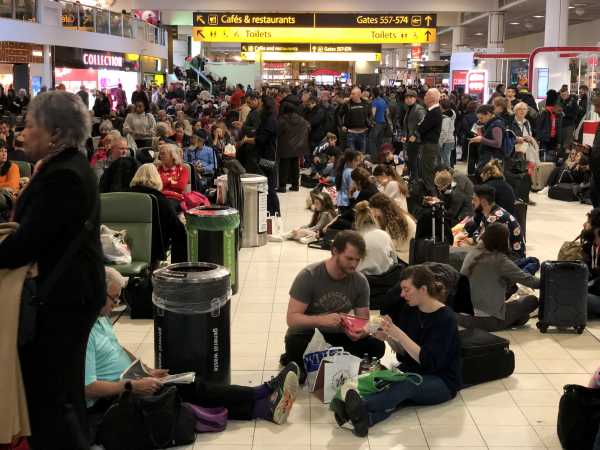
The UK’s Gatwick Airport is in total chaos due to mysterious, unexplained drones that keep flying near the airport, leaving planes grounded for nearly 24 hours and tens of thousands of travelers stranded.
The drone sightings began Wednesday around 9 pm local time in Sussex, where the airport is located. Two drones were spotted flying near the runway, and flights were immediately suspended. The airport tried to reopen briefly around 3 am, Britain’s Guardian newspaper reports, but was promptly shut down again just 45 minutes later after another drone sighting. A drone was spotted yet again around midday on Thursday, and the airport has remained closed.
The drones seem to reappear each time the airport tries to reopen, according to a reporter with Britain’s Sky News who is at the scene.
So far, 657 out of 760 scheduled flights have been canceled, the Guardian reports. Gatwick expects the chaos to continue into tomorrow and has begun advising passengers not to come to the airport. Britain’s army has now been called in to help and is deploying “specialist equipment” to deal with the situation, according to the UK Ministry of Defence.
As of now, though, there appears to be no end in sight to the travel nightmare afflicting tens of thousands.
This is the exact kind of chaos and disruption drone security experts have been warning about for years
The fact that just one or two drones have been able to completely shut down the UK’s second-biggest airport may seem stunning to most people, but it’s the exact situation security experts have been warning could happen for years.
“This was easy to see coming,” says Peter Singer, a strategist and senior fellow at the New America think tank in Washington and a leading expert on drone technology. “We’re lucky that this incident was not way worse, and that worse outcome scenario is unfortunately also easy to see coming.”
In 2016, as the BBC notes, Toby Harris, a British politician in the Labour Party, spearheaded an independent review looking into London’s preparedness in the event of a terrorist attack. That review “highlighted the potential for drones to be used to disrupt flights,” the BBC reports.
In response to the Gatwick Airport crisis, Harris told Britain’s Radio 4 that there has been a “complacency” toward drones and called on the government to use current technology that “sends the drones back to the sender …or makes them spiral very slowly down to the ground.”
But that may be easier said than done.
“There’s hardly anything on the counter-drone market that works on two or more drones at once,” says Kelsey Atherton, a technology writer who has covered drones for years. “And of the systems billed as capable of handling that, there’s no independent verification that the Center for the Study of the Drone can point to,” he adds, referring to a research institution at New York’s Bard College that focuses on both military and civilian uses of unmanned systems like drones.
The fact that counter-drone technology has failed to keep pace with the staggering spread of drones around the world means we’re likely to see more incidents like the one at Gatwick Airport — just hopefully not always during peak holiday travel season.
Sourse: vox.com






